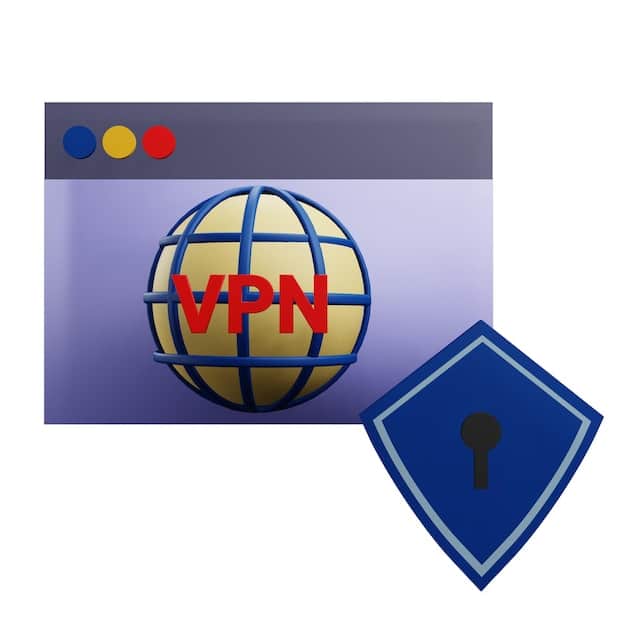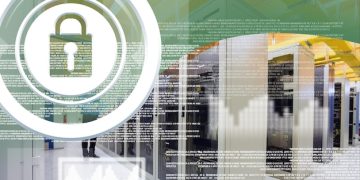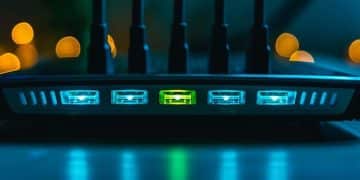VPN vs. Proxy: Choosing the Best Cybersecurity Protection in the US

Choosing between a VPN vs. proxy for cybersecurity protection in the US depends on your specific needs; VPNs offer comprehensive encryption and privacy, while proxies provide limited anonymity and are best for bypassing geo-restrictions.
In the US, safeguarding your online activities is paramount. Understanding the differences between a VPN vs. proxy is crucial for making informed decisions about your cybersecurity.
Understanding VPNs: A Comprehensive Overview
A Virtual Private Network (VPN) is a service that encrypts your internet traffic and routes it through a server in a location of your choice. This process hides your IP address and protects your data from being intercepted by third parties.
Using a VPN is like creating a secure tunnel for your data on the internet. This ensures that your online activities remain private and protected, especially when using public Wi-Fi networks.
How VPNs Work
VPNs work by encrypting your internet traffic, which means converting it into an unreadable format. This encrypted data is then sent through a secure connection to a VPN server located in a different location.
Key Features of VPNs
- Encryption: VPNs encrypt your internet traffic, making it unreadable to hackers and snoopers.
- IP Address Masking: VPNs hide your real IP address, replacing it with the IP address of the VPN server.
- Server Locations: VPNs offer a wide range of server locations, allowing you to bypass geo-restrictions and access content from different countries.
- Security Protocols: VPNs use various security protocols like OpenVPN, IKEv2, and WireGuard to ensure a secure connection.

In summary, VPNs provide a robust solution for enhancing your online security and privacy, offering encryption, IP address masking, and access to a global network of servers.
Exploring Proxies: Basics and Functionality
A proxy server acts as an intermediary between your device and the internet. When you use a proxy, your internet traffic is routed through the proxy server, which then forwards it to the website or service you are trying to access.
While proxies can provide some level of anonymity, they typically do not offer the same level of encryption and security as VPNs. Understanding their limitations is crucial for making an informed choice.
Types of Proxies
- HTTP Proxies: Primarily used for web browsing, HTTP proxies handle HTTP traffic.
- SOCKS Proxies: More versatile than HTTP proxies, SOCKS proxies can handle various types of traffic, including email and FTP.
- Transparent Proxies: Often used by organizations to monitor and filter internet traffic, transparent proxies do not hide your IP address.
How Proxies Work
Proxies work by receiving your internet traffic and forwarding it to the destination server. This process masks your IP address, making it appear as if the traffic is coming from the proxy server.
However, unlike VPNs, proxies typically do not encrypt your data, which means your traffic can be intercepted and read by third parties.
In conclusion, proxies offer a basic level of anonymity by masking your IP address, but they lack the robust encryption and security features of VPNs.
VPN vs. Proxy: Detailed Comparison
Choosing between a VPN and a proxy depends on your specific needs and priorities. VPNs offer comprehensive security and privacy, while proxies provide limited anonymity and are often used for bypassing geo-restrictions.
Understanding the key differences between these two technologies can help you make an informed decision about which one is right for you.
Security and Encryption
VPNs provide strong encryption, protecting your data from being intercepted by hackers and snoopers. Proxies, on the other hand, typically do not offer encryption, leaving your data vulnerable.
Privacy and Anonymity
Both VPNs and proxies can hide your IP address, providing some level of anonymity. However, VPNs offer better privacy due to their encryption capabilities, which prevent your data from being monitored.
Speed and Performance
The speed and performance of VPNs and proxies can vary depending on the server location and network conditions. In general, proxies tend to be faster than VPNs because they do not encrypt your data.

In summary, VPNs offer superior security and privacy compared to proxies, while proxies may provide faster speeds but lack encryption. Choose the option that best aligns with your security and privacy needs.
Cybersecurity Benefits of Using a VPN in the US
In the US, using a VPN offers numerous cybersecurity benefits, including protecting your data on public Wi-Fi, bypassing geo-restrictions, and preventing online tracking.
With the increasing number of cyber threats, a VPN can provide an essential layer of protection for your online activities.
Securing Public Wi-Fi Connections
Public Wi-Fi networks are often unsecured, making them vulnerable to hacking and data theft. A VPN encrypts your internet traffic, protecting your data from being intercepted on public Wi-Fi.
Bypassing Geo-Restrictions
Many websites and streaming services restrict access based on your location. A VPN allows you to bypass these geo-restrictions by connecting to a server in a different country.
Preventing Online Tracking
Websites and advertisers often track your online activities to gather data about your browsing habits. A VPN hides your IP address, making it more difficult for them to track you.
In other words, using a VPN in the US can significantly enhance your online security and privacy, protecting you from various cyber threats and online tracking.
Limitations and Risks of Using Proxies for Security
While proxies can provide some level of anonymity, they also have limitations and risks when it comes to cybersecurity. Proxies typically do not offer encryption, leaving your data vulnerable to interception.
Understanding these limitations is important for making an informed decision about whether a proxy is sufficient for your security needs.
Lack of Encryption
One of the main limitations of proxies is that they do not encrypt your internet traffic. This means your data can be intercepted and read by hackers and snoopers.
Potential for Logging
Proxy servers can log your IP address and browsing history, which can compromise your privacy. It’s important to choose a reputable proxy provider that does not keep logs.
Vulnerability to Attacks
Proxies can be vulnerable to attacks, such as man-in-the-middle attacks, where hackers intercept your internet traffic and steal your data.
In conclusion, proxies have significant limitations and risks when it comes to cybersecurity, making them less secure than VPNs. Consider these factors when choosing between a VPN and a proxy.
Making the Right Choice for Your Needs
The decision between using a VPN or a proxy depends on your specific needs and priorities. If you require strong security and privacy, a VPN is the better choice. If you only need basic anonymity and are primarily concerned with bypassing geo-restrictions, a proxy may be sufficient.
Consider your specific requirements and the potential risks and benefits of each option before making a decision.
When to Use a VPN
- When you need to protect your data on public Wi-Fi
- When you want to bypass geo-restrictions and access content from different countries
- When you need to prevent online tracking and protect your privacy
When to Use a Proxy
- When you only need basic anonymity
- When you want to bypass geo-restrictions without encrypting your data
- When speed is more important than security
Ultimately, the best choice depends on your individual needs and priorities. Weigh the pros and cons of each option carefully to make the right decision for your cybersecurity protection.
| Key Aspect | Brief Description |
|---|---|
| 🔒 Encryption | VPNs encrypt data; proxies usually don’t. |
| 📍 IP Masking | Both hide your IP address to some extent. |
| 🚀 Speed | Proxies can be faster due to no encryption. |
| 🌐 Geo-Bypassing | Both can bypass geo-restrictions on content. |
Frequently Asked Questions
▼
The primary difference is that a VPN encrypts all your internet traffic, while a proxy typically does not, offering less comprehensive protection.
▼
Proxies might offer slightly better speeds due to no encryption, but VPNs provide better security against DDoS attacks and other threats.
▼
Yes, using both together can provide an extra layer of security, but it may also slow down your internet speed. Ensure compatibility between the two services.
▼
Free services may log your data or contain malware. Paid options generally offer better security and privacy. Always research the provider beforehand.
▼
VPNs usually require downloading an app, while proxies can be configured in your browser settings. Follow the specific instructions provided by your chosen service.
Conclusion
In conclusion, understanding the distinctions between a VPN and a proxy is essential for ensuring your cybersecurity in the US. While proxies offer a basic level of anonymity, VPNs provide comprehensive encryption and security, making them the preferred choice for protecting your online activities from cyber threats. Evaluate your specific needs and choose the option that best aligns with your security and privacy goals.





